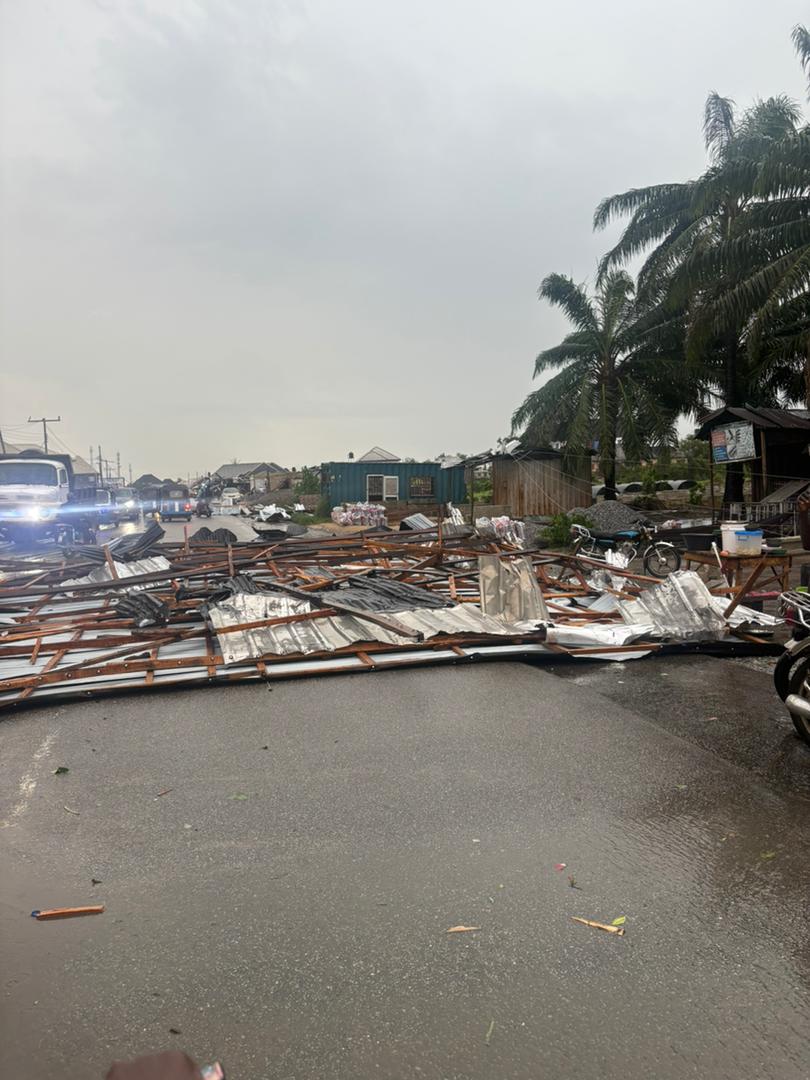/ News
Views: 1511
Tears in the Storm: Delta communities count losses as rainstorm leaves families homeless

A devastating rainstorm swept through Jeddo, Ughoton, and Ugbokodo communities in Delta State's Okpe Local Government Area on Tuesday, leaving destruction in its wake and dozens of families displaced. With damaged homes, collapsed infrastructure, and traumatized residents, the Delta State Emergency Management Agency (SEMA) says it is still working to assess the full scale of the disaster.
Tragedy struck Jeddo, Ughoton, and Ugbokodo communities in Okpe Local Government Area as a fierce rainstorm accompanied by hail battered the area earlier this week, tearing through homes, schools, healthcare centers, and other public infrastructure.
Pebnews report that Residents, many of whom were caught off-guard by the suddenness and intensity of the storm, are now left grappling with the harsh aftermath—displacement, property loss, and uncertainty.
The Director of the Delta State Emergency Management Agency (SEMA), Mr. Karo Ovemeso, who visited the scene with his team, described the level of devastation as “overwhelming.” According to him, while a comprehensive enumeration of the affected properties is still ongoing, early signs suggest that the scale of destruction is extensive.
“We went there yesterday and started assessing the level of wreckage left in the wake of the rainstorm,” Ovemeso told reporters. “The damage is overwhelming. We are taking our time with this assessment to ensure that no affected household is left out. Everyone must be captured.”
Across the communities, the signs of devastation were impossible to ignore. Roofs were ripped from buildings, roofing sheets wrapped dangerously around electric poles, and shattered building materials littered compounds and roadsides. Household items—beds, mattresses, cooking pots, electronics—soaked from the rain, were piled into corners as families scrambled to salvage what they could.
Among the critically hit were schools, healthcare centers, places of worship, streetlights and small businesses that form the heartbeat of the local economy. Business owners could be seen surveying the remnants of their shops, their wares—many ruined by water—strewn across muddy floors.
One resident, Mrs. Grace Oharisi, held back tears as she watched her children sit outside their now roofless home. “We didn’t expect this. It happened so fast. We are sleeping in another family’s home for now. There are five of us. We are pleading with the government to come to our aid. We have nowhere else to go.”
In many parts of the affected communities, families are now sharing cramped living spaces with neighbors and relatives who managed to avoid the worst of the storm. Makeshift repairs are underway, but with limited resources, most are relying on government intervention for shelter and relief.
SEMA’s director affirmed that the state government had already dispatched a high-level delegation to the disaster zone—a signal, he said, of its readiness to respond.
“When government sends such a senior delegation to visit the site of a disaster, it means something concrete is being planned,” Ovemeso said. “But we need to finish the damage assessment first. The process cannot be rushed if we want to be thorough and fair.”
As the assessment continues, the hope in these battered communities is clear: that their cries are heard and urgent help is on the way.
“We’ve lost a lot,” said a local school teacher, whose classroom block was flattened by the storm. “But what we really need now is support—temporary shelter, food, medical aid, and help to rebuild. We are resilient, but we can’t do this alone.”